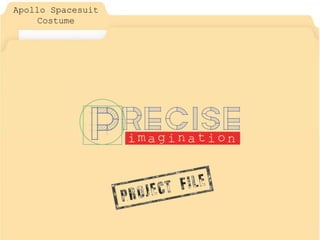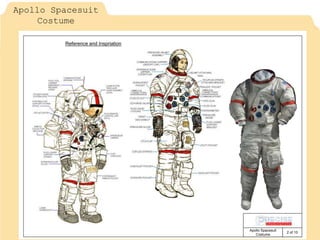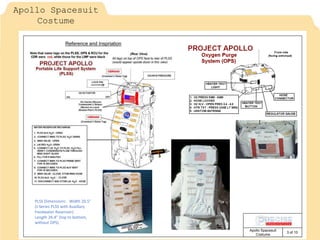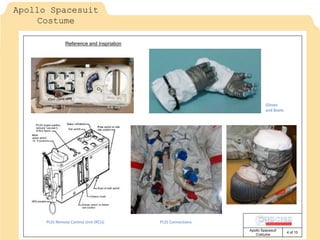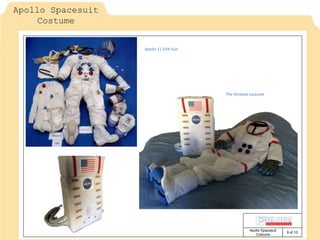Apollo Space Suit
- 2. Apollo Spacesuit Costume Objective To create an authentic scaled representation of an Apollo spacesuit as a Halloween costume. Background At some point doesn’t every kid want to be an astronaut? But commercially available space suit costumes are, shall we say, rather low fidelity – and with good reason. A space suit incorporates a daunting amount of custom hardware and tailoring, and no suit is more complex, or iconic than the lunar EVA suits worn during the Apollo missions. How to make something good enough to be considered a child-sized scaled replica without a NASA sized budget? That was the challenge. Design When trying to reproduce a complex but highly recognizable object like the space suit, key in on the signature elements that define what people remember. In this case it was the red helmet ring, the red and blue hose fittings on the front of the suit, and perhaps the grey gloves with blue rubber tips. The second thing is to get the important proportions correct. For the suit, that meant scaling the Portable Life Support System (the backpack) to the size of the intended wearer. At first it may seem overly large but when in place, with an appropriately bulky suit, the 80% backpack contributes to the overall authenticity without people even realizing why. Finally, add as many detailed markings as possible. These graphics are often the simplest elements to create but do the research and take the time to make them as accurate as possible. Examples on the suit include the instructions and the Velcro tabs on the PLSS, the red stripes that identified the commander on the later Apollo missions, and the patches and name tapes. 1 of 10 Apollo Spacesuit Costume Construction The coveralls were a commercial astronaut costume selected solely because they featured puffy stuffing to give the suit bulk. Patches and name tapes were added, and red duct tape was used to make the sleeve and leg striping. The helmet ring is a painted embroidery hoop. It secures a piece of fabric which covers the front and back of the coveralls like a vest. This provides an easy-to-work-with surface for mounting the hose connections and simplifies getting the suit on and off. The geometry of the hose fittings is an important detail that contributes to realism. Although now there are readily down- loadable files that can be 3D printed, the connector hardware seen here are aquarium tank fittings. The hoses are electronic cable loom tubing sheathed in fabric, so they are very lightweight. To make the PLSS, layers of pink house foam board was glued and cut to shape and then covered in fabric. The same technique was used to fabricate the control box on the front of the suit. The fingertips of blue latex gloves were cut off and then stretched over a pair of grey winter gloves to replicate this distinctive Apollo suit feature. Similarly, blue rubber rainboots were allowed to peak out from under fabric to give the appearance of the rubber over-soles worn by the astronauts while on the moon. Ink-jet printable fabric makes it possible to replicate the various markings on the Portable Life Support System (PLSS) and Oxygen Purge System (OPS). The communications carrier or “snoopy” cap was made by stitching together two swim caps, one white and one black.
- 3. Apollo Spacesuit Costume Reference and Inspriation 2 of 10 Apollo Spacesuit Costume
- 4. Apollo Spacesuit Costume Reference and Inspriation 3 of 10 Apollo Spacesuit Costume PLSS Dimensions: Width 20.5" (J-Series PLSS with Auxillary Feedwater Reservoir) Length 26.4" (top to bottom, without OPS)
- 5. Apollo Spacesuit Costume Reference and Inspriation 4 of 10 Apollo Spacesuit Costume PLSS Remote Control Unit (RCU) PLSS Connections Gloves and Boots
- 6. Apollo Spacesuit Costume 5 of 10 Apollo Spacesuit Costume YOUR NAME Print Graphic – OPS, Top
- 7. Apollo Spacesuit Costume 6 of 10 Apollo Spacesuit Costume Print Graphic – OPS, Back
- 8. Apollo Spacesuit Costume 7 of 10 Apollo Spacesuit Costume Print Graphic – PLSS, Back YOUR NAME
- 9. Apollo Spacesuit Costume 8 of 10 Apollo Spacesuit Costume Print Graphic – PLSS, Back YOUR NAME
- 10. Apollo Spacesuit Costume 9 of 10 Apollo Spacesuit Costume Apollo 11 EVA Suit The finished costume
- 11. Apollo Spacesuit Costume 10 of 10 Apollo Spacesuit Costume Ready for Liftoff!

